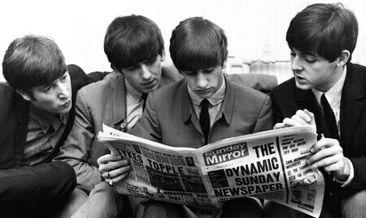Vatican 'forgives' John Lennon.
By David Willey
BBC News, Rome


At the time radio stations banned their music and concerts were cancelled
|
A Vatican newspaper has forgiven the late English singer John Lennon
for saying four decades ago that The Beatles were more popular than
Jesus.
In an article praising The Beatles, L'Osservatore Romano said Lennon had just been showing off.
Lennon told a British newspaper in 1966 - at the height of Beatlemania
- that he did not know which would die out first, Christianity or rock
and roll.
At the time, the comparison sparked controversy in the US.
The semi-official Vatican newspaper marked the 40th anniversary
of The Beatles' "White Album" with an article praising Lennon and the
Fab Four from Liverpool.
Youthful joke
The paper dismissed Lennon's much-criticised remark that the Beatles were more famous than Jesus Christ as a youthful joke.
The paper described the remark as "showing off, bragging by a
young English working-class musician who had grown up in the age of
Elvis Presley and rock and roll and had enjoyed unexpected success".
L'Osservatore Romano recently got a new editor and now - apart from
chronicling the Pope's daily doings and printing the texts of papal
speeches - it sometimes runs articles on entertainment on inside pages,
together with extensive reporting on world affairs.
In a half-page illustrated article, the paper praised The
Beatles for what it called their "unique and strange alchemy of sounds
and words".
The newspaper said The Beatles's songs had shown an
extraordinary capacity for survival and the White Album album remained
a "magical musical anthology".
In another article on the same page entitled "Twilight of the
gods" the newspaper lamented the passing of the golden days of
Hollywood and said the mysterious fascination of the star system of
Hollywood in the 1950s had been superseded by the cult of so-called
celebrities.
Although Pope Benedict has criticised many aspects of modern
pop culture, he now allows the newspaper of the tiny independent
Vatican state to reflect the reality of the world outside in a way that
would have been unthinkable in the days of Pope Paul VI who reigned
during heyday of The Beatles.

 | Группа "Гости" | RSS
| Группа "Гости" | RSS 
 | Группа "Гости" | RSS
| Группа "Гости" | RSS 